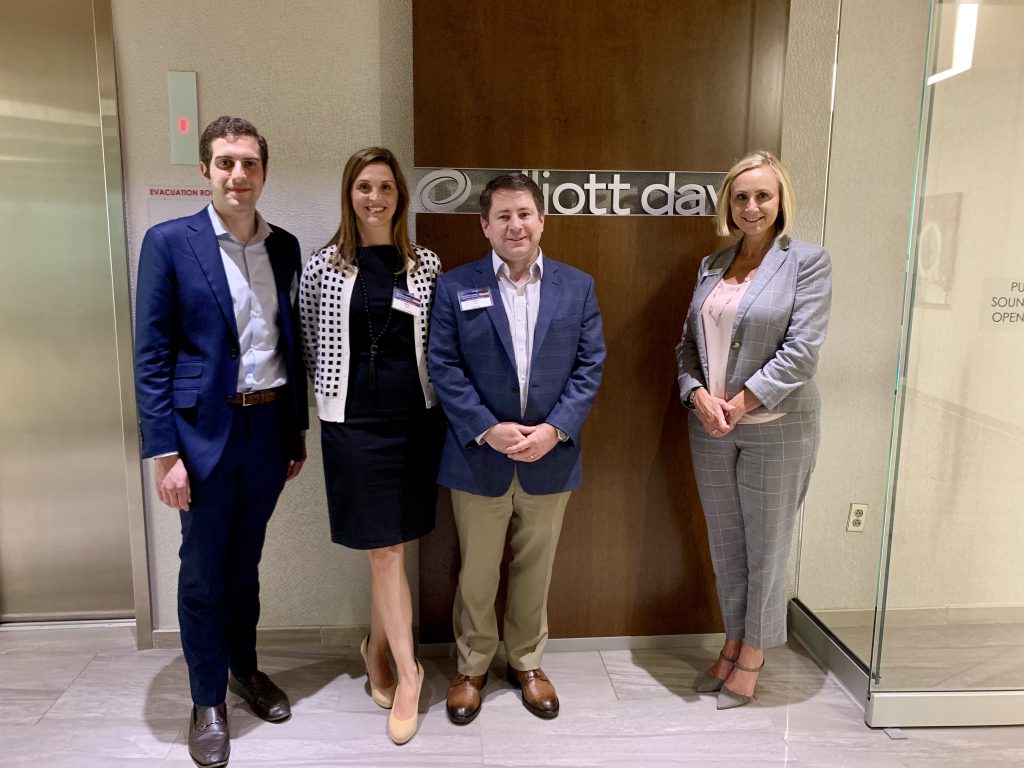
Contributed by Marshall Harvey, CPA, Principal of Elliott Davis
On Wednesday July 24th, the Elliott Davis Private Equity specialty group along with event partner, Hedge Connection, hosted a networking reception and panel discussion for industry experts in its offices in Charlotte, North Carolina.
The highlight of the evening was a panel discussion of current and emerging trends in private equity capital raising. The panel discussion, moderated by Renee Ford, Elliott Davis shareholder and investment company practice group leader, featured industry experts, Paul Foley, Chair, Investment Management Practices for Akerman; Marcello Halizer, Founder and CEO of Buttonwood Network, and Haley Cheek, VP Investor Relations with Frontier Capital.
The panel discussed the current trends in capital raising including the increase in private equity fund launches versus hedge and venture fund launches; the abundance of available capital which is making the capital raising process very competitive and exhausting; and the compressed fundraising cycles which put pressure on the fund managers to produce. Investors are asking that fund managers invest in areas where they have experienced success in the past and that they demonstrate the ability to deploy successful strategies that generate competitive returns.
Technology is playing a more integral role in capital raising as software options are now available to track the fund raising process and increase efficiencies. Funds are now considering the use of technology rather than placement agents in the fundraising process and technology platforms can make the research process more efficient because deal information can be easily accessed and aggregated. Technology is also creating opportunities to access retail investors and the SEC’s recently issued Concept Release relaxing the rules around exempt offerings could also result in more opportunities for retail investors to invest in private equity. However, panelist Paul Foley commented “While many industry commentators are clamoring for retail investors to have access to private equity, it is unlikely that an SEC rule change is imminent.” Foley stated further that “Even if the rules were to change, private equity isn’t an investment class that lends itself to $2,000 investments.” The panelists agreed that while technology is changing the fundraising process for private equity managers, investing in this asset class is still very much based on relationships and trust. As such, technology most likely will not completely replace people in the foreseeable future.
Technology is also playing a role in the increase in direct investments in private companies. Panelist Marcello Halitzer stated that “many traditional LPs are increasingly investing directly in private companies (instead of through an outside managed fund). This trend will continue as technology increases access to this broader group of capital providers.”
The panelists also discussed the increase in secondary transactions. Secondary transactions are often used as a liquidity tool in portfolio management by allowing investors to re-balance portfolios if a particular asset class is outpacing other classes. Panelist Haley Cheek indicated that “Secondaries are changing the dynamics of the industry; LPs are more comfortable making large commitments because they know they can get out of them.” With the increase in non-traditional private equity investors – family offices, insurers, pension funds and endowments, it is expected that secondary transactions will continue to increase in the near-term. This new group of non-traditional investors is also migrating towards making co-investments and direct investments rather than investing in funds. As the cost of launching funds continues to rise and with the competitive nature of the fundraising process, managers could be looking for alternatives to the traditional fund model. Serving as a consultant to these new groups of non-traditional investors could be a way for managers to build relationships and trust with these investors through the successful sourcing of deals.
Co-investing is another area that is on the rise. In general, investors view co-investing as a good way to make an in-depth evaluation of portfolio companies perceived as being the best ideas of a fund while reducing the overall fees they are paying. The additional costs to fund managers to administer co-investing opportunities are typically weighed against the opportunities to participate in investments where they might not otherwise have sufficient capital, so typically, a fund will allow co-investing only if it is compatible with their investment strategy.
Elliott Davis has been building relationships with private equity fund managers for over 30 years and has a range of services suited to support the needs of fund managers, portfolio companies and investors. For more information on our services please contact our Private Equity Practice Leader, Brett Lanzl or our Investment Company Practice Leader, Renee Ford.


Leave a Reply